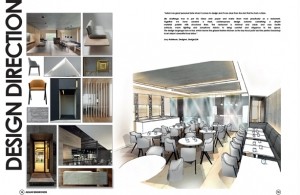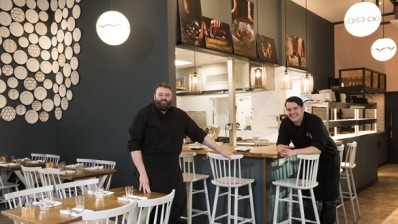Restaurant finance: Start-up funding

The good news is, never before have there been as many start-up financing options as there are now. New businesses are popping up all the time, and investors everywhere are looking for the next big thing. Granted, a lot of interest is going to the tech world, thanks to a growing list of almost instant success stories, but hospitality is undeniably gaining ground.
So where to start? Who to speak to? How to present your project? BigHospitality speaks to experts and financiers about the different options available.
Equity v debt
Unsurprisingly, the first finance source most people think about is banks – which can provide relatively low-interest debt financing to be rapid on a fixed monthly basis, and benefit from various government incentive schemes (Exeter restaurant Forn is a good example).
But for banks (or any other debt finance provider) to grant your application, you will most likely need to have a significant amount of equity, or seed funding – a combination of your own savings and other shareholding contributions.
In fact, the equity-to-debt ratio has become a lot more equity-heavy since the financial crisis, when banks were forced to constrain their lending limits.
One of the most fashionable ways to raise equity in today’s market is through crowdfunding. “Crowdfunding effectively covers three different industries: pledge or reward funding whereby people put money in and get some sort of reward back [but no stake in the business] – Kickstarter and Indiegogo are good examples; peer-to-peer lending; and equity fundraising, the largest platform being Crowdcube,” says Chris Rose, founder of equity fundraising and peer-to-peer debt lending platform Karadoo.
Hospitality crowdfunding successes regularly make headlines: The Clove Club raised £250,000, or 25 per cent of its equity, on Crowdcube in 2012 to open its first permanent venue in Shoreditch – and went on to be listed in the World’s 50 Best Restaurants.
Similarly, Pizza Rossa raised £440,000 in just 17 days on the same platform earlier this year.
Crowdfunding: successes and failures
There is no doubt that crowdfunding has big potential for the hospitality industry.
“The equity market is huge but could be a lot bigger, and the democratisation of investment through crowdfunding will help to improve that and increase the flow of capital into early stage businesses,” Crowdcube CEO Luke Lang tells BigHospitality.
“Crowdfunding has its roots firmly planted now. Peer-to-peer lending has really taken off, and equity crowdfunding is becoming much more mature. If you look at the businesses that are now choosing to raise finance through platforms like ours and others – these are established brands with well-known entrepreneurs behind them that have finance options. That’s certainly a good indication that people like the democratisation of crowdfunding.”
But not everyone manages to raise funds this way. According to Lang, only 35 per cent of business that hosted a campaign on Crowdcube reached their target in 2014, leaving about two-thirds unfunded.
For some very unique businesses, a crowdfunding failure doesn’t have to mean giving up on the idea: in a very publicised example, Cereal Killer Café managed to secure its Shoreditch site despite raising only £1,015 of its £60,000 KickStarter campaign target. At the time the founders explained that the crowdfunding exercise gave them the “exposure” they’d been looking for.
But these cases are few and far apart. For most start-ups, it seems the success of crowdfunding campaigns is down to two things. First, marketing must be clear and professional, and having a recognisable brand is crucial.
“You may not have a well-known brand yet but you should always have a clearly defined brand with a logo, a website reflecting your values and looking professional and high quality. These things are important because they instil confidence in the investor,” says Lang.
Strong following
But even more importantly, the companies that are the most successful in raising equity through crowdfunding are the ones with a strong following. “We shouldn’t underestimate how important having a strong community is, and with the advent of social media that’s become more and more apparent,” he adds.
In some cases, entrepreneurs can build on their reputation. For chef Adam Simmonds, currently raising funding through Karadoo, a having cooked at Michelin-starred restaurants and participated in the BBC’s Great British Menu are valuable assets.
“Adam has worked at a couple of restaurants, but he’s never actually owned his own restaurant, so he needed funding,” says Rose. “We set up a company called Marlow Restaurants Ltd, and we’re raising £1.1m for Adam to do that through that company. The money will be raised by selling shares in that business, and in the end investors will have a 45 per cent stake in the business.
“Investors may or may not be aware of Adam already, but the industry will certainly seem more glamorous than what they usually get across their desks. At the moment we are getting 15 to 20 investor enquiries a day.”
The pop-up solution
But what about the entrepreneurs that are starting from scratch? How can you build a following when people know nothing about you or your business? The answer is: pop-ups.
“Essentially what pop-ups do is give operators a way start up a business without the need for financing. Your typical example is someone who’s a sous chef at a top restaurant or someone looking to get into the food industry and make a name for themselves without having a prior reputation,” says Olivia Sibony, founder of Grub Club.
The company helps chefs find spaces to host their pop-ups, whether it be in cafes usually closed in the evening, or pubs on quiet nights – and in a lot of cases, there is no rent to pay.
“As a chef, I’m going to go to the pub and cut a deal with the owner to use the venue for free but let them serve the alcohol. If I bring 50 customers, the pub will make money from the alcohol sales, and I’ve got no risk on my side. That’s the most cost-effective way to do it, and pubs already have kitchens and crockery,” she adds.
A good example of a business that started out this way is United Ramen. After hosting seven pop-ups around the start of 2014, founder Aaron Resch was able to launch his first permanent site in Islington in September.
“It’s incredibly tough out there for someone to start a restaurant or food business, and it’s a huge leap to quit your safe job to start off your own restaurant. Before Grub Club, there was no bridge between the two but this gives people a platform to build their profile, refine their menu and get a following, as well as build a case to go to financial backers, by proving their concept,” Sibony points out.





























